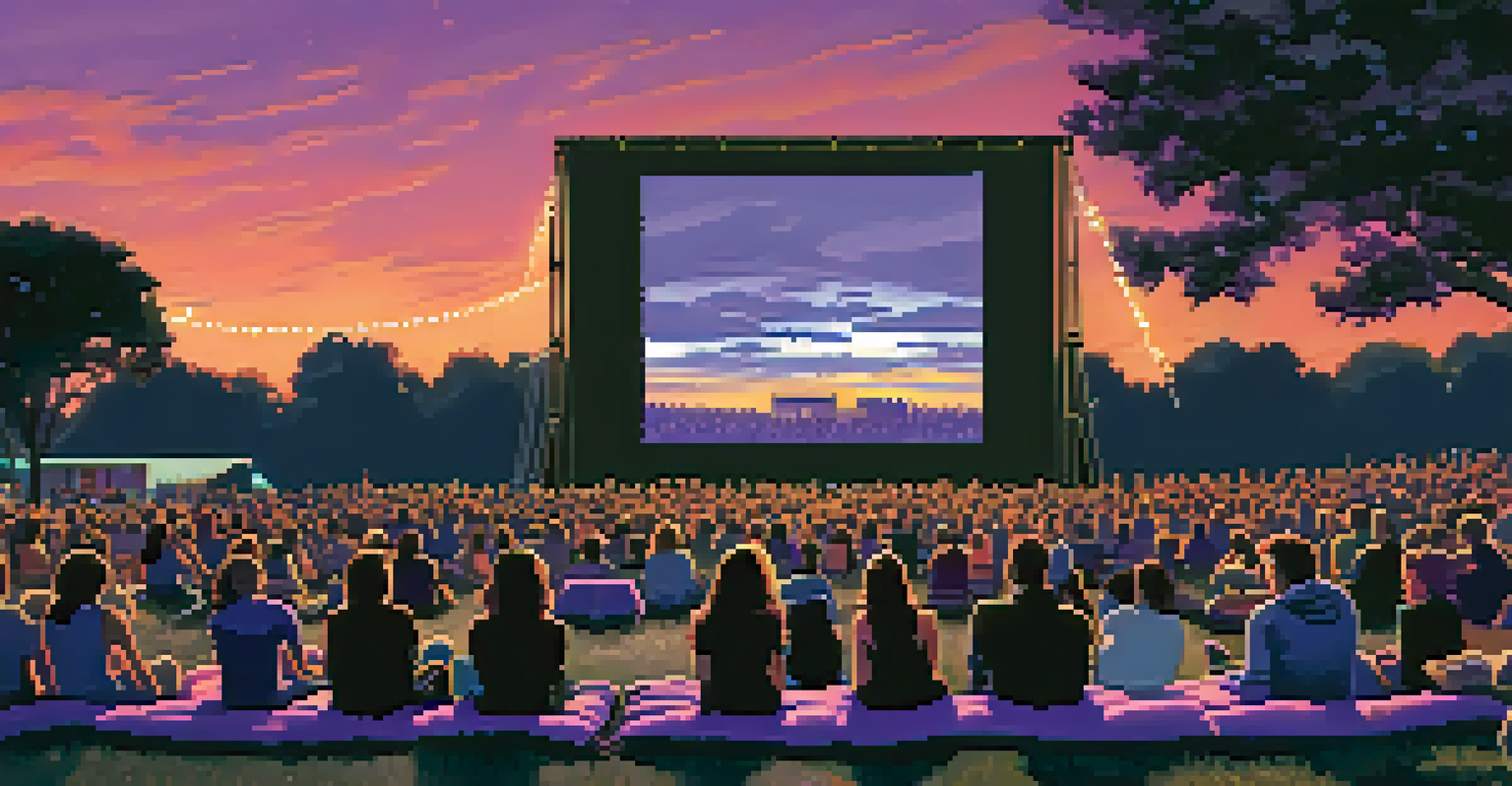Engaging with Film Criticism: A Guide for Aspiring Critics

Understanding the Role of a Film Critic
A film critic serves as a guide for audiences, helping them navigate the vast world of cinema. They analyze films not just for entertainment value, but also for artistic merit, cultural significance, and emotional impact. This role is essential in shaping public perception and discourse about films, making it vital to approach criticism with responsibility and insight.
The critic is a man who prefers the indigestible to the palatable.
Critics often dive into various elements of a film, such as direction, acting, cinematography, and sound design. By breaking down these components, they help viewers appreciate the craft behind the scenes. This analytical approach also encourages audiences to consider their personal interpretations and emotional responses to films.
Moreover, understanding the critic's role can provide aspiring critics with a clearer vision of their purpose. They can strive not only to review films but also to foster a deeper conversation about cinema, encouraging viewers to think critically about what they watch.
Developing a Personal Voice in Film Criticism
Finding your unique voice is crucial for any aspiring critic. It allows you to express your opinions authentically, making your reviews relatable and engaging. Think of your voice as your signature style, much like a filmmaker’s distinctive approach to storytelling.

One way to develop this voice is by writing regularly, whether it’s through a blog, social media, or even journaling your thoughts on films. Experiment with different styles and tones—be witty, serious, or personal, depending on the film and your feelings about it. Over time, your authentic voice will naturally shine through your writing.
The Role of a Film Critic
Film critics guide audiences by analyzing movies for their artistic and cultural significance, shaping public perception.
Remember, your perspective is valid, and sharing it can resonate with others. By embracing your individuality, you’ll not only stand out among critics but also create a genuine connection with your readers.
Building a Strong Foundation in Film Knowledge
To critique films effectively, a solid foundation in film history and theory is essential. Understanding the evolution of cinema, major movements, and influential filmmakers will enhance your analysis. It’s like being a chef; knowing your ingredients and techniques makes for better dishes.
Film is a truth 24 times a second.
Engage with various resources, from classic films to contemporary releases, and explore different genres and styles. Documentaries, books, and online courses can provide valuable insights into filmmaking techniques and storytelling methods. This knowledge will enrich your critiques by offering context and depth.
Additionally, following film festivals and industry news can keep you informed about current trends and innovations. Staying updated not only broadens your perspective but also enables you to engage in discussions with fellow critics and cinephiles.
Mastering the Art of Film Analysis
Film analysis involves dissecting a movie to understand its deeper meanings and themes. It requires a keen eye for detail and the ability to connect various elements, such as plot, character development, and visual style. Think of it as solving a puzzle—every piece contributes to the overall picture.
To master this art, practice watching films with a critical lens. Take notes during viewings, focusing on specific scenes, dialogues, and cinematographic choices that stand out. Afterward, reflect on how these elements contribute to the film's overall message or emotional impact.
Developing Your Unique Voice
Finding your authentic voice in film criticism allows you to connect with readers and express your opinions engagingly.
Engaging in discussions with fellow film enthusiasts can also sharpen your analytical skills. Sharing perspectives and interpretations can open your mind to new ideas, enhancing your understanding of films and improving your critique.
Engaging with the Film Community
Becoming part of the film community is vital for any aspiring critic. Networking with other critics, filmmakers, and cinephiles can provide valuable opportunities for growth and collaboration. This engagement creates a supportive environment where you can share insights and learn from others’ experiences.
Attend film festivals, screenings, and local events to immerse yourself in the community. These gatherings often offer discussions, panels, and Q&A sessions that can deepen your understanding of the industry. Plus, they present a great chance to meet like-minded individuals who share your passion for film.
Online platforms, such as social media groups and forums, are also excellent venues for connection. Engaging in discussions, sharing your reviews, and seeking feedback can help you refine your voice and broaden your audience.
Navigating Ethical Considerations in Film Criticism
Ethics play a crucial role in film criticism, as critics must navigate personal biases and the impact of their words. Being honest and fair in your assessments is vital, as your reviews can influence public opinion and a film's success. Think of it as holding a mirror to the film industry; your reflections should be clear and truthful.
It's important to disclose any potential conflicts of interest, such as relationships with filmmakers or studios, to maintain transparency. This practice builds trust with your audience and upholds the integrity of your critiques. After all, readers appreciate authenticity and will value your insights more if they feel confident in your objectivity.
Engaging with the Film Community
Networking with fellow critics and cinephiles enhances your growth and provides opportunities for collaboration in film criticism.
Additionally, consider the broader implications of your reviews. Criticism can shape cultural conversations and perceptions, so it's essential to be aware of how your words might resonate with diverse audiences. Strive for sensitivity and inclusivity, ensuring your critiques contribute positively to the film discourse.
Utilizing Digital Platforms for Film Criticism
In today’s digital age, aspiring critics have a wealth of platforms at their fingertips for sharing their work. From blogs and YouTube channels to podcasts and social media, the opportunities are endless. These platforms allow you to reach diverse audiences and explore different formats for your critiques.
Start by choosing a platform that resonates with you. If you enjoy writing, a blog might be ideal, while those who prefer speaking might find podcasts or video reviews more appealing. Experiment with various formats to see what feels most natural and engaging for you.

Utilizing digital tools can also enhance your content. Incorporate visuals, such as stills or clips from films, and engage with your audience through comments and social media interactions. This dynamic approach not only enriches your critiques but also fosters a sense of community among your readers or viewers.
Continuously Evolving as a Film Critic
The world of film is ever-changing, making it essential for critics to adapt and grow alongside it. Continuously seeking knowledge, experimenting with new styles, and embracing feedback can help you evolve as a critic. Think of yourself as a film character on a journey—each experience adds depth to your narrative.
Stay open to exploring different genres, filmmakers, and cultural perspectives. This diversity not only broadens your understanding of cinema but also enriches your critiques, allowing you to connect with a wider audience. Remember, every film offers a new opportunity for learning.
Lastly, don’t shy away from revisiting your past reviews. Reflecting on your growth and understanding how your perspectives have shifted over time can be incredibly insightful. Embrace the journey of becoming a better critic—it's a rewarding process that will enhance both your craft and your connection with the film community.